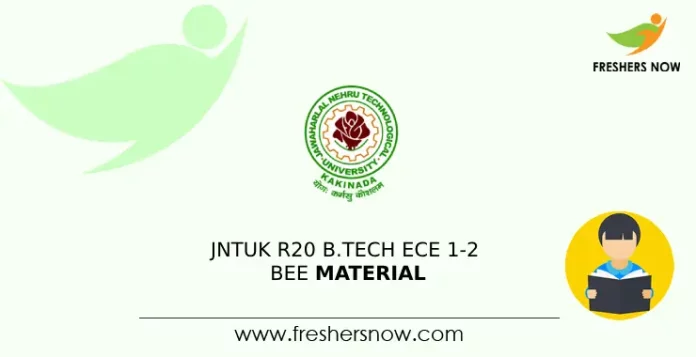
JNTUK R20 B.Tech ECE 1-2 BEE Material/ Notes PDF Download: For JNTUK R20 B.Tech ECE 1-2 BEE Material, students delve into comprehensive study materials covering Basic Electrical Engineering (BEE) essential for their academic journey. These resources provide in-depth insights into DC generators’ and motors’ operational principles, constructional aspects, and performance characteristics. Exploring starting methods and speed control techniques for DC motors equips learners with practical knowledge crucial for their engineering pursuits.
Additionally, the material delves into the construction, operation, and performance analysis of transformers, synchronous machines, and 3-phase induction motors. With detailed explanations and downloadable PDFs, students can enhance their understanding and excel in their coursework. Accessing JNTUK R20 B.Tech ECE 1-2 Basic Electrical Engineering Material ensures a holistic learning experience, empowering students to grasp fundamental concepts effectively.
JNTUK R20 B.Tech ECE 1-2 BEE Material – Units
| No. Of Units | Name of the Unit |
| Unit – 1 | DC Machines |
| Unit – 2 | Transformers |
| Unit – 3 | Synchronous Generators, Synchronous Motors |
| Unit – 4 | Induction Machine |
| Unit – 5 | Special Machines |
Unit 1 Syllabus PDF Download | JNTUK R20 B.Tech ECE Basic Electrical Engineering Material
DC Machines: Principle of operation of DC generator – emf equation – types of DC machines – torque equation of DC motor – applications – three point starter – losses and efficiency – Swinburne’s test – speed control methods – OCC of DC generator- Brake test on DC Shunt motor numerical problems
| JNTUK R20 B.Tech ECE 1-2 BEE Material – PDF Download | |
| To Download The JNTUK R20 B.Tech ECE 1-2 BEE Unit 1 Notes PDF | Download PDF |
Unit 2 Syllabus PDF Download | JNTUK R20 B.Tech ECE Basic Electrical Engineering Material
Transformers: Principle of operation of single phase transformer constructional features – EMF equation – Losses and efficiency of transformer- regulation of transformer – OC & SC tests predetermination of efficiency and regulations – Sumpner’s test- numerical problems.
| JNTUK R20 B.Tech ECE 1-2 BEE Material – PDF Download | |
| To Download The JNTUK R20 B.Tech ECE 1-2 BEE Unit 2 Notes PDF | Download PDF |
Unit 3 Syllabus PDF Download | JNTUK R20 B.Tech ECE Basic Electrical Engineering Material
Synchronous Generators: Principle of operation and construction of alternators – types of alternators Regulation of alternator by synchronous impedance method-EMF equation of three phase alternator
Synchronous Motors: Construction of three-phase synchronous motor – operating principle –equivalent circuit of synchronous motor.
| JNTUK R20 B.Tech ECE 1-2 BEE Material – PDF Download | |
| To Download The JNTUK R20 B.Tech ECE 1-2 BEE Unit 3 Notes PDF | Download PDF |
Unit 4 Syllabus PDF Download | JNTUK R20 B.Tech ECE Basic Electrical Engineering Material
Induction Machine: Principle of operation and construction of three-phase induction motors – slip ring and squirrel cage motors – slip-torque characteristics – efficiency calculation – starting methods- Brake test on 3-phase Induction Motor.
| JNTUK R20 B.Tech ECE 1-2 BEE Material – PDF Download | |
| To Download The JNTUK R20 B.Tech ECE 1-2 BEE Unit 4 Notes PDF | Download PDF |
Unit 5 Syllabus PDF Download | JNTUK R20 B.Tech ECE Basic Electrical Engineering Material
Special Machines: Principle of operation and construction – single phase induction motor – shaded pole motors – capacitor motors and AC servomotor.
| JNTUK R20 B.Tech ECE 1-2 BEE Material – PDF Download | |
| To Download The JNTUK R20 B.Tech ECE 1-2 BEE Unit 5 Notes PDF | Download PDF |
JNTUK R20 B.Tech BEE Material – Outcomes
- DC generators convert mechanical energy into electrical energy through electromagnetic induction, with characteristics like stable voltage output.
- DC motors transform electrical energy into mechanical energy through electromagnetic induction, offering controllable speed and torque.
- 3-phase induction motors operate by inducing a rotating magnetic field in the stator, with starting methods including direct online and soft starters.
- Synchronous machines synchronize rotational speed with AC power frequency, crucial for applications requiring precision.
- Special machines, like stepper and servo motors, serve specific purposes such as precise positioning and automation control.
For more details about JNTUK R20 B.Tech ECE 1-2 BEE Material and other materials follow our official website Freshersnow.com.



